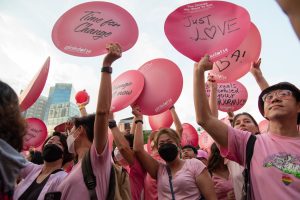Singapore’s parliament yesterday repealed its colonial-era ban on sex between men, a long-standing goal of the country’s LGBTQ rights movement, but one that was soured by the concurrent approval of a constitutional amendment protecting the definition of marriage against legal challenge.
After a two-day debate, the repeal of the colonial-era law was passed with a majority of 93 to three votes, while the constitutional amendment passed by 85 votes to two.
Prime Minister Lee Hsien Loong announced in August that his government planned to repeal Section 377A of the penal code, which prohibits “any act of gross indecency with another male person.” During his annual televised National Day Rally address, Lee said that the repeal of the law was the “right thing to do” and that most Singaporeans would accept the change.
Even though Section 377A has not been actively enforced for years, many LGBTQ Singaporeans have reasonably viewed it as a discriminatory symbol and called for its appeal.
In a speech during the debate on Monday, Law and Home Affairs Minister K Shanmugam said that the “time has come to remove Section 377A.”
“It humiliates and hurts gay people,” he told lawmakers. “Most gay people do not cause harm to others, they just want to live peacefully and quietly and be accepted as part of society the same as any other Singaporean.”
Back in 2015, Kris Hartley wrote an article for The Diplomat arguing that to “stay ahead of its regional peers and retain talent, Singapore should continue its willingness to eschew ideology in favor of pragmatism” and repeal Section 377A. This is more or less exactly what the ruling People’s Action Party has now done.
But this concession to the city-state’s LGBTQ community has been counterbalanced by a concession to social conservatives: namely, the addition of a new constitutional provision (Article 156) effectively enshrining the legislative definition of marriage as a union between a man and a woman.
In this way, and in what Lee in his August speech described as a “political accommodation,” the Singaporean government has enshrined one gain for LGBTQ activists, while placing another – the recognition of same-sex marriages – effectively out of bounds.
Addressing Parliament yesterday, Shanmugam stated that the constitutional change would protect the definition of marriage as a union between man and woman, along with the various laws and policies – such as Singapore’s social housing policy – based on that definition.
“Just as we have been clear about repealing 377A – we took a clear position – we are equally clear, and this government is very clear, that we will protect the heterosexual marriage as a key institution in our society,” he said, according to a report by Channel News Asia (CNA).
Shanmugam earlier said that such protection was needed in order to shield against “creative arguments” challenging the definition of marriage.
In his speech, CNA reported, Shanmugam also noted that there were a “small” number of individuals who were convicted between 1988 and 2007 for private and consensual homosexual acts. He said he had instructed his ministry to consider how their records could be purged of the criminal charges.
LGBTQ advocacy groups both applauded the repeal of Section 377A and expressed consternation at the compromise that the PAP felt it was necessary to make with social and religious conservatives. Pink Dot, an LGBTQ advocacy group that has organized annual rallies calling for the repeal of the law, described it as a “historic milestone for LGBTQ+ equality.”
LGBTQ activist Tan Seng Kee, who has campaigned against the rule, largely agreed, but said that he was “dismayed” by the constitutional amendment that accompanied it. “My hopes for the future are that every Singaporean LGBT citizen will be entitled to exactly the same rights that our heterosexual counterparts take for granted, no more, no less,” he said, in a statement quoted by the South China Morning Post.

































